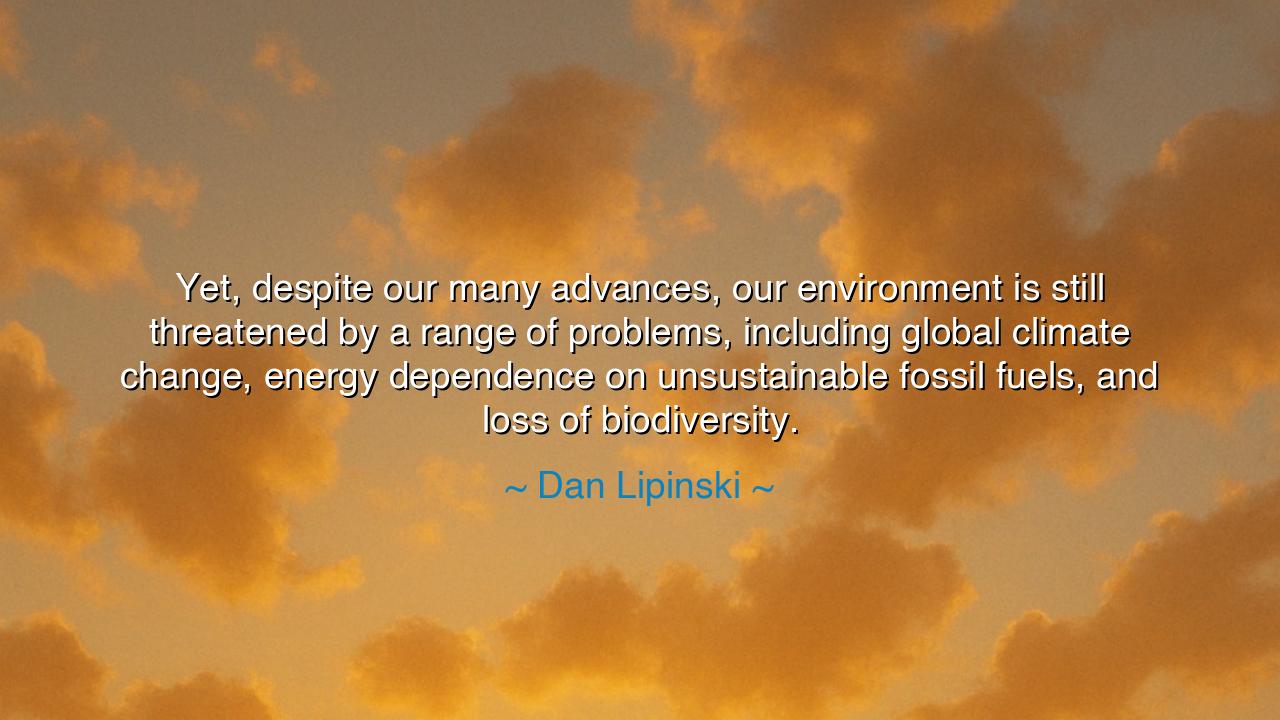
Yet, despite our many advances, our environment is still
Yet, despite our many advances, our environment is still threatened by a range of problems, including global climate change, energy dependence on unsustainable fossil fuels, and loss of biodiversity.






Hear the sober bell that tolls beneath the glitter of our age: “Yet, despite our many advances, our environment is still threatened by a range of problems, including global climate change, energy dependence on unsustainable fossil fuels, and loss of biodiversity.” In this sentence, Dan Lipinski places a mirror before our triumphs and shows the shadow standing just behind them. We have taught metal to fly and glass to think; we have flung our voices across oceans and stitched cities with light. And yet the ground beneath these marvels is trembling, the air is fevered, the waters are burdened with the memory of our haste. Progress without prudence becomes a chariot that forgets its horses need grass.
The meaning is a braid of three cords. First, global climate change—the slow arithmetic of heat, where invisible gases make visible grief: longer droughts, hungrier fires, storms that move with a conqueror’s swagger. Second, energy chained to unsustainable fossil fuels—ancient sunlight ripped from stone and burned with a spendthrift’s joy, leaving debts for our descendants to collect. Third, the loss of biodiversity—a quiet unpeopling of the more-than-human world, where bees fall like unwritten poems and reefs blanch like erased pages. Each cord tightens the others; together they draw a noose around the living order.
The origin of such a warning rises from the ledger of the last two centuries. We opened coal’s black treasury and oiled the gears of industry; we multiplied comfort and lifespan—and multiplied tailpipes and smokestacks with them. We netted seas with a hunger only empires once knew; we cut forests into neat arithmetic, forgetting that a forest is not a sum of trees but a parliament of relationships. Our advances were real, and so were their externalities—costs uncounted because they were paid by rivers, coasts, and creatures with no vote.
Let a story be lantern to the mind. In the Gulf of Mexico, a single wound—an offshore blowout—spread a slick scripture across the water, writing the names of pelican and shrimp in a dark hand. The nation learned, briefly, the price of energy torn from the deep without reverence. Elsewhere, a different page turned: a warming world blanched the coral that had been nurseries for nations of fish; fishermen’s children learned a thinner taste of the sea. Here are parables without metaphors: when we mortgage tomorrow for today’s combustion, the bill arrives in habitat lost and livelihoods shaken.
Yet there is another history, braided through the first: the history of repentance and repair. We saw a hole torn in the sky and stitched it with treaty and technology; we cleansed rivers once set aflame by our impatience; we set aside lands where wolves could sing and forests grow old again. These are not excuses for delay, but proofs that advances can be yoked to stewardship—that the same ingenuity which wounds can also heal when guided by humility and law.
What, then, is the counsel to pass down like a family tool? First, that climate is not a headline but a household: insulate, electrify, and power with wind, sun, water, and storage—so heat is not fed with fossils we cannot afford to burn. Second, that energy prudence begins with using less well—efficiency as the cheapest plant ever built, demand shaped to fit the rhythms of clean supply. Third, that biodiversity is not scenery but system: plant natives, guard wetlands, reconnect fragments with corridors, and buy food that keeps soil alive. In these acts, the heroic is made daily.
Finally, let the tone of our century be not boast but vow. Measure what matters—carbon, habitat, resilience—and bind budgets to those measures. Educate for belonging—to a place, to a watershed, to a future whose eyes will look back and judge whether we loved them. Organize markets and laws so that the honest work of sustainability is rewarded, and the lazy habit of unsustainable fossil fuels pays its true price. Do this with steadfast joy, and Lipinski’s warning becomes a waypoint rather than an epitaph: proof that despite our many advances, we chose wisdom to complete them—so the environment that raised us might remain a home, not a memory.






AAdministratorAdministrator
Welcome, honored guests. Please leave a comment, we will respond soon